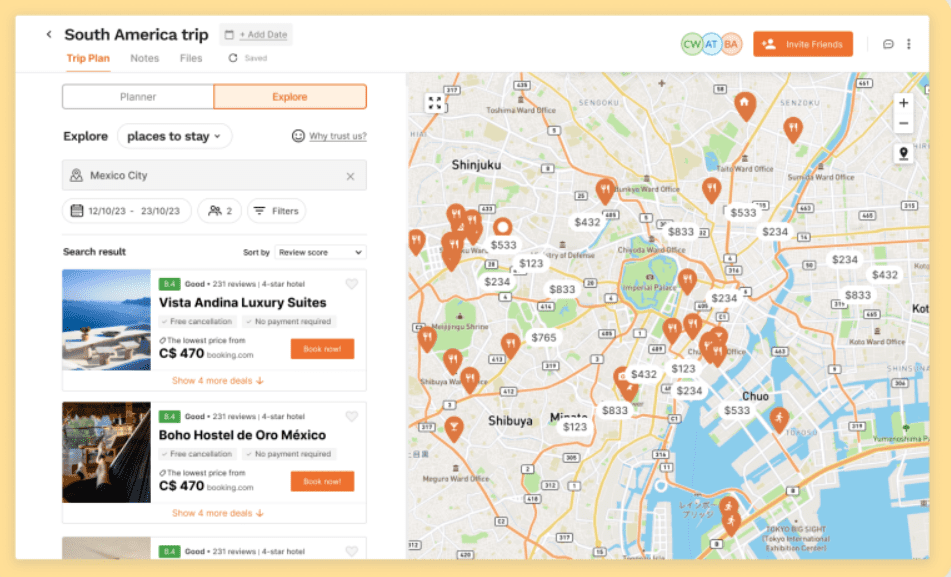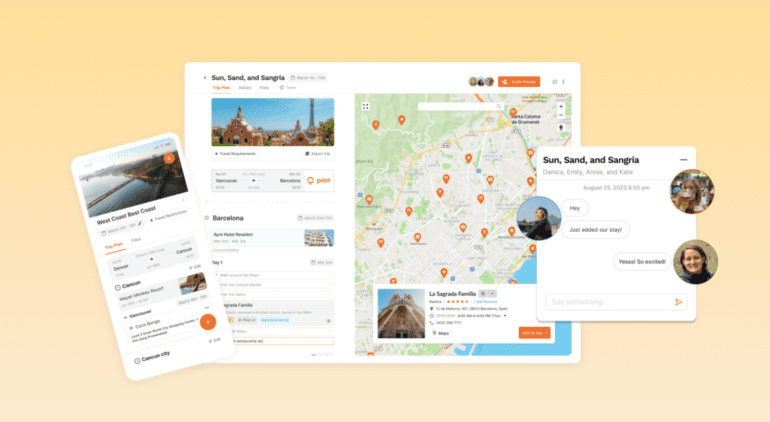TL;DR:
- Pilot, a Vancouver-based startup, aims to be the central hub for global travel experiences.
- They offer an AI-powered social trip-planning platform for discovering, organizing, and sharing trips.
- Founded by Connor Wilson in 2019, the beta app quickly gained over 5,000 users by 2022.
- Pilot focuses on personalization, collaboration, and social connections in travel planning.
- Their AI trip planner, Quickstart, creates personalized itineraries and facilitates real-time adjustments.
- Users can book accommodations and flights and share their travel experiences on the platform.
- Pilot operates on an affiliate model, generating revenue from vendor commissions.
- Expansion plans include Latin American and Asian markets, targeting underserved travelers.
- They participated in the Creative Destruction Lab accelerator program and seek $4 million in funding.
Main AI News:
In the realm of travel innovation, Pilot, a Vancouver-based startup, is emerging as a formidable player. This ambitious venture aspires to establish itself as the epicenter of the global travel experience. At its core, Pilot harnesses the power of artificial intelligence to craft an all-encompassing social trip-planning platform. Its mission is crystal clear: to empower individuals in discovering, organizing, reserving, and sharing their journeys with companions. This enterprising startup, a proud member of the esteemed Battlefield 200 cohort, recently took center stage at TechCrunch Disrupt 2023 in San Francisco.
Pilot’s genesis can be traced back to the visionary mind of its Founder and CEO, Connor Wilson. A seasoned entrepreneur with a fervent passion for travel, Wilson conceptualized Pilot in 2019 during his European adventures. In a twist of fate, the year 2020 brought the onset of the COVID-19 pandemic, grounding travelers worldwide. Undeterred, Wilson, alongside a group of like-minded co-founders, embarked on the journey of creating Pilot. The beta version of their innovative app took flight in 2022, gaining remarkable traction with over 5,000 users, all without any active marketing efforts. Astoundingly, this user base has since soared to exceed 20,000, a testament to Pilot’s undeniable appeal.
Wilson attributes this resounding success to Pilot’s unique positioning within the travel planning landscape. Unlike conventional approaches characterized by rigidity and isolation, Pilot places the traveler at the forefront. It champions collaboration and personalization, blending technology seamlessly with the social aspects of travel. However, Wilson is quick to clarify that Pilot is not aiming to construct a traditional social network. Instead, it envisions itself as a provider of consumer software enriched with social functionality, akin to tech stalwarts like Google Docs, Notion, and Strava, rather than being in the mold of Facebook.
It’s worth acknowledging the existence of numerous AI-driven travel applications, but Pilot stands apart in its purpose. It is not a platform for strangers to serendipitously meet and travel together, nor does it function as an AI-powered travel agency. Wilson underscores that Pilot users maintain control over their travel plans, sharing them exclusively with individuals they choose. The platform equips them with tools to facilitate connection and collaboration with friends, family, and partners throughout their journeys.
Pilot’s AI-powered trip planner, dubbed Quickstart, takes the helm in crafting personalized itineraries, driven by the preferences of the traveling party. It also enables users to make real-time adjustments through seamless AI-powered chat interactions. Getting started is a breeze—users simply sign up, create a trip, and effortlessly customize it with a few clicks, selecting specific interests to include. The platform further streamlines the booking process for accommodations and flights. Once the adventure concludes, users can chronicle their experiences by sharing their trips on Pilot’s blog.
At first glance, Quickstart may evoke thoughts of ChatGPT, but its distinctive visual layout and robust recommendations set it apart as a unique offering. Pilot operates on an affiliate model, providing free access to consumers while earning commissions from vendors when users book their travel arrangements through the platform. Although revenue generation is not the current focus, Wilson affirms that Pilot’s journey thus far, centered on nurturing a vibrant community, has positioned them to explore an array of monetization possibilities.
Pilot’s web application is accessible worldwide, catering to English-speaking countries, with a mobile app slated for release later this year. The company’s ambitions extend beyond horizons, with plans to expand into the Latin American and Asian markets, serving a diverse array of travelers. While Pilot aims to cater to a wide spectrum of globetrotters, its current user base predominantly comprises underserved travelers—those who relish group adventures, backpackers, digital nomads, and remote workers seeking to enrich their shared experiences.
In a testament to its potential, Pilot participated in this year’s Creative Destruction Lab accelerator program. The startup has already garnered approximately $650,000 in funding from angel investors, but it now sets its sights on a more substantial $4 million investment to bolster the development of its social platform segment.

Source: Pilot
Conclusion:
Pilot’s innovative approach to travel planning, emphasizing social connections and personalization through AI, positions it as a disruptor in the market. Their rapid user growth without extensive marketing suggests strong market demand for a more collaborative and tailored travel experience. As Pilot expands to new markets and refines its social platform, it has the potential to reshape the way travelers plan and share their journeys, making it an exciting prospect for investors and travelers alike.

